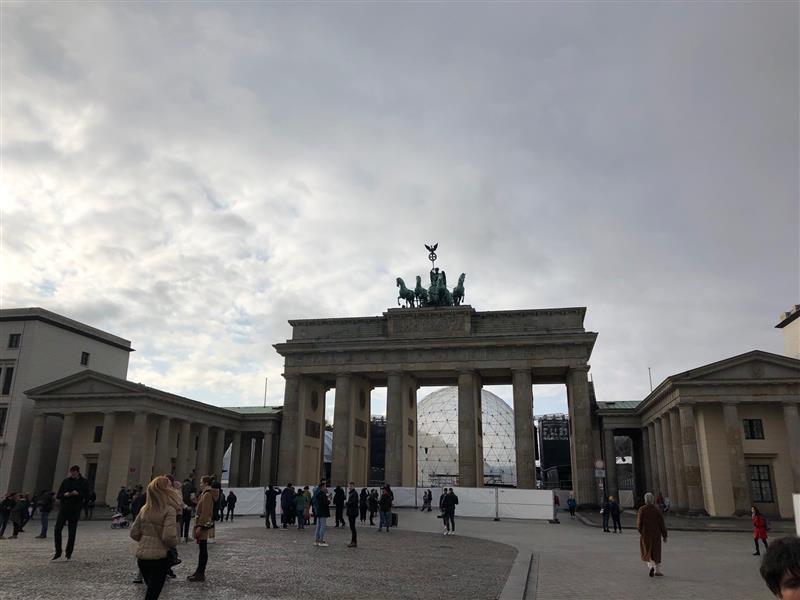Continuing the American Fight to Advance Democracy Worldwide

November marks 30 years since the fall of the Berlin Wall, but authoritarianism is still with us and growing stronger. Today, from Hong Kong to Venezuela, ordinary people are pushing back against authoritarian regimes. This anniversary is the perfect time for democracy advocates, such as the International Republican Institute (IRI), to reassert commitments and pursue new approaches.
The Berlin Wall crumbled 30 years ago beneath mounting internal and external pressures. Leading up to the fall, economic decline mobilized civil societies in the Soviet-controlled Eastern Bloc to demand reforms in favor of free market principles and democratic rights. Endemic corruption paralyzed authoritarian bureaucracies. Five months before the wall’s collapse, Poland and Hungary began peaceful transitions to democracy, with East Germany soon following their lead.
Civil unrest led the East German government to change travel restrictions, and a blundered November 1989 press conference attracted flocks of East and West Berliners to find out what was happening. By 1990, the physical and symbolic barrier between capitalist democracy and communist dictatorship — the Berlin Wall — no longer existed. The next year, the mighty Soviet Union didn’t either. Today, 15 independent nations stand in its place.
1989 was a year of global upheaval. Students took to the streets of Beijing to protest Chinese Communist Party corruption and were slaughtered in the Tiananmen Square Massacre. That same year, Omar al-Bashir launched a coup in Sudan ushering in a period of deep oppression, corruption and genocide. Bashir was removed from power by popular protests earlier this year.
The collapse of the Berlin Wall exposed undemocratic regimes for what they are — weak, corrupt and unstable. But it didn’t uproot them forever — the jungle has a way of growing back. The anniversary of the fall of the Berlin Wall must be more than a day of commemoration, it must be a call to reinvigorate the fight for liberty, democracy and the rule of law wherever it is endangered.
In Samuel Huntington’s 1991 article on “Democracy’s Third Wave,” he argued that democratic declines are characterized by social and political polarization; the exclusion of populist and leftist movements by the middle and upper-class; terrorism; interventions by nondemocratic foreign powers; and a number of other conditions that bear a frightening resemblance to those of today’s world. But political scientists have long imagined what a “fourth wave” of democratization might look like, following the third wave that arguably concluded with the fall of the Soviet Union. After all, actual wave dynamics require water levels to decline before they come crashing back.
On the crest of a possible fourth wave, now is the right time to reassert what successful democracy promotion looks like. To make sure that the next wave of democratization is lasting, the work of democracy advocates must emphasize two new approaches.
First, democracy advocates need to communicate the mission to wider audiences, especially those at home. And they must do so in a way that is transparent. Mission transparency means asserting and ensuring that democracy support is only about process and never about determining outcomes. However, in closed authoritarian states that reject the democratic process itself, democracy promotion is absolutely about supporting the rights of people (to be specific, registered voters) to put dictators out of business peacefully.
Second, democracy promotion organizations must respond to endemic corruption and kleptocracy abroad. When there is no free press, no competitive elections and little regard for individual rights — such as property, speech, religion or assembly — corruption becomes ingrained in political and economic life. The result is kleptocracy, or rule by theft, which roots down like a weed and spreads across national borders.
The journey to democracy is not an easy one. It takes practice on the part of both the people and the government; it takes training of civil societies, the media, political parties, and government leaders; and it takes the continued support of the international community. Democracy organizations such as the International Republican Institute, empower people around the world with the knowledge and skills to usher in democratic transitions against all odds.
Did Ronald Reagan think that demanding Mikhail Gorbachev “tear down this wall” would end the U.S.S.R.? Probably not, but Reagan knew that democracy is the only model of governance that offers an opportunity to limit government excess and champion the individual rights of the people. For dictatorships, democracy is a threat to the very survival of the authoritarian elites in power.
Protecting and promoting the democratic process is the sacred responsibility of those already enjoying its benefits, especially in a global economy. Advancing democracy is just as necessary today as it was in 1989.
Top